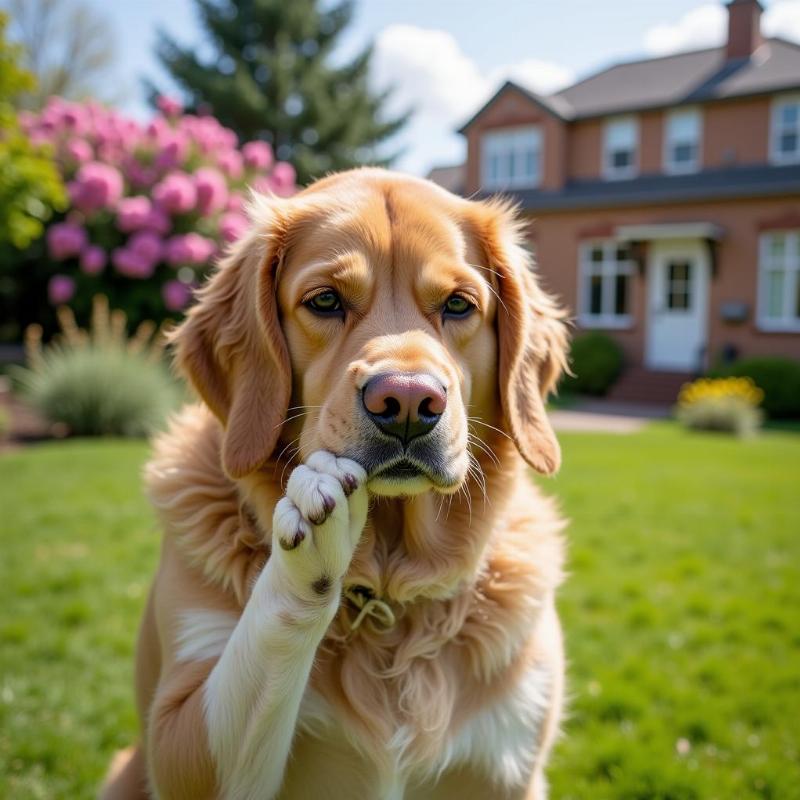If your dog keeps rubbing his nose with his paws, it could be a simple itch or a sign of something more serious. Understanding why your furry friend is engaging in this behavior is crucial for their well-being. This article will delve into the common reasons behind paw-to-nose rubbing, how to identify potential problems, and when it’s time to seek professional veterinary help in the US.
Decoding Your Dog’s Nose Rubbing: Allergies, Irritation, or Something Else?
Dogs rub their noses for a variety of reasons, from simple itches to underlying medical conditions. It’s important to observe the frequency, intensity, and accompanying symptoms to determine the root cause. Is it a quick swipe or a persistent scrub? Are there other signs like sneezing, discharge, or paw licking? Answering these questions can help you understand if your dog’s nose rubbing is a cause for concern.
Common culprits include environmental allergies (pollen, dust mites, mold), food allergies, or contact irritants (certain cleaning products, perfumes). Parasites like fleas, mites, and ticks can also cause intense itching and nose rubbing. Less common, but potentially more serious reasons include nasal foreign bodies, infections, or even tumors.
 Dog Rubbing Nose Due to Allergies
Dog Rubbing Nose Due to Allergies
Is It Just an Itch or a Sign of Allergies?
Allergies are a prevalent issue among dogs in the US. If your dog’s nose rubbing is accompanied by other symptoms like excessive scratching, watery eyes, or skin redness, allergies are a strong possibility. Consider your dog’s environment. Has there been a recent change in weather, new cleaning products introduced, or a switch in their diet? These factors can often trigger allergic reactions.
It’s crucial to identify the specific allergen causing your dog’s discomfort. Consult with a veterinarian experienced in allergy testing and treatment. They may recommend blood tests, skin tests, or elimination diets to pinpoint the trigger.
When to Seek Veterinary Care for Your Dog’s Nose Rubbing
While occasional nose rubbing might be harmless, persistent or intense rubbing warrants a visit to your local veterinarian. If your dog is exhibiting other symptoms such as sneezing, nasal discharge (clear, yellow, or bloody), paw licking, head shaking, or changes in appetite or behavior, immediate veterinary attention is essential. These could indicate more serious conditions requiring prompt diagnosis and treatment.
Early intervention is key to effectively managing any underlying medical issues. Don’t hesitate to seek professional help if your dog’s nose rubbing is causing them distress or disrupting their quality of life.
Could it be a Nasal Foreign Body?
Sometimes, a foreign object lodged in your dog’s nasal passage can cause irritation and lead to persistent nose rubbing. If your dog suddenly starts rubbing their nose excessively, especially after playing outdoors, a foreign body might be the culprit. Symptoms may also include sneezing, bloody nasal discharge, and pawing at the nose.
Do not attempt to remove the object yourself. Instead, seek immediate veterinary care. Your veterinarian has the necessary tools and expertise to safely remove the foreign body and address any resulting inflammation or infection.
Conclusion: Addressing Your Dog’s Nose Rubbing
Observing your dog’s behavior and recognizing potential warning signs is crucial for their health and happiness. While occasional nose rubbing might be normal, persistent or intense rubbing coupled with other symptoms should not be ignored. Consulting with a veterinarian is the best way to determine the underlying cause and ensure your furry friend receives the appropriate care.
FAQ
- Why does my dog rub his nose on the carpet? This could be due to allergies, irritation, dryness, or even a simple itch.
- What are signs of dog allergies? Common signs include itching, scratching, sneezing, runny nose, watery eyes, skin redness, and paw licking.
- When should I take my dog to the vet for nose rubbing? If the rubbing is persistent, intense, or accompanied by other symptoms like nasal discharge or sneezing, consult a vet.
- Can I give my dog Benadryl for allergies? Consult your veterinarian before giving your dog any medication, including over-the-counter options like Benadryl.
- How can I prevent my dog’s allergies? Identifying and avoiding allergens, regular grooming, and a healthy diet can help manage allergies.
- What are common allergens for dogs? Common allergens include pollen, dust mites, mold, certain foods (beef, chicken, dairy), and flea bites.
- How is a dog allergy diagnosed? Veterinarians can perform allergy testing through blood tests, skin tests, or elimination diets.
Beautdogs.us: Your Trusted Source for Dog Care in the US
Beautdogs.us is your premier destination for all things dog-related in the US. We offer expert advice on dog breeds, care, and lifestyle, providing valuable resources for both novice and experienced dog owners. From understanding your dog’s quirky behaviors to choosing the right products and services, Beautdogs.us is your trusted companion on the journey of dog ownership. Contact us today for expert guidance and support. Email: [email protected]. Phone: +1 501-555-7529.